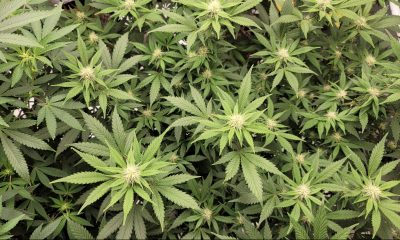Politics
Vermont Governor Vetoes Bill On ‘Reducing The Criminalization’ Of Drugs By Setting Personal Use Amounts

Vermont’s governor has vetoed a bill that would have charged a state panel with standardizing personal use amounts of various illegal drugs. Reformers saw the measure as a first step toward decriminalizing drug possession in the state.
The bill vetoed by Gov. Phil Scott (R) on Thursday, H.505, also would have removed the state’s sentencing distinction between crack and powder cocaine, a difference critics say disproportionately punishes people of color.
In a veto statement, Scott wrote that the bill, which would not itself have changed criminal laws around drug possession, placed “no limits on which drugs can be contemplated for legalization or the amounts.”
“I agree that the criminal justice system cannot, and should not, be the only tool in this work — and in Vermont, it is not,” the governor said. “However, we cannot completely abandon reasonable regulation and law enforcement as a tool.”
Drug reform advocates, however, point out that the bill would not have legalized any drug-related conduct in Vermont and would have reduced penalties only around crack to put them in line with powder cocaine.
“This bill is a step—a tiny, baby step—in the direction of reducing the harms of drugs,” said Dave Silberman, a pro bono drug reform advocate and the elected high bailiff for Addison County. “The governor’s veto statement makes the bill out to be a decriminalization bill, when in fact it did no such thing.”
Scott also vetoed a separate bill that would have made expungements ever so slightly easier to get for people who've already served their sentences.
— Dave Silberman (@DaveSilberman) May 20, 2022
(Disclosure: Silberman supports Marijuana Moment’s work through a monthly pledge on Patreon.)
“I think there is a distinct pattern of conduct by the governor,” Silberman continued, “to say things like, ‘We need to treat substance use disorder as a medical problem,’ followed by actions that are directly contradictory to those kinds of statements.”
Scott’s veto statement complains that the legislation included “absolutely no recognition of the often-disastrous health and safety impacts of using drugs like fentanyl, heroin, cocaine, methamphetamines, and more.” Nor, the governor said, “does it acknowledge the role of enforcement in tracking down and stopping the dealers who seek to poison Vermonters—including children—for profit.”
Scott also pointed to provisions in the bill itself that seem to contemplate future steps toward decriminalization, such as a line that says an intended goal of the reform would be “preventing and reducing the criminalization of personal drug use.”
As originally introduced, H.505, which state lawmakers sent to Scott’s desk earlier this month, would have made a number of changes to Vermont’s drug laws, for example reclassifying some felonies as misdemeanors. As the measure made its way through the legislature, however, lawmakers chipped away at the bill while also added provisions from a separate decriminalization measure introduced this session, H.644.
Two lawmakers filed similar decriminalization legislation last year, but that bill did not advance.
The version of H.505 lawmakers ultimately sent to Scott contained two significant reforms, which together spanned about five pages. They included removing the legal distinction between crack and powder cocaine as well as setting up a so-called Drug Use Standards Advisory Board under the Vermont Sentencing Commission.
“The Board may provide additional recommendations to the Commission and the General Assembly regarding how to transition from a criminal justice approach to a public health approach to addressing drug possession,” the bill said.
While the advisory board would serve an important purpose if lawmakers choose to pursue decriminalization, Silberman said, the primary goal of forming the body was simply to clarify how people currently use drugs in Vermont and how much of a given drug the average user tends to possess or consume.
“The bill creates this advisory board to give the next legislature information,” he said. “The governor doesn’t even want to know. He’s clearly sticking his head in the sand and refusing to accept information, which is stunning.”
Silberman said Vermont’s existing penalties and possession thresholds for drugs are incoherent. “It’s as if somebody threw darts at a dartboard.”
That incoherence, he argued, has led to sharp disparities in how the state’s drug law impacts people. A report published earlier this year by the Council of State Governments Justice Center found that Black people in Vermont are 14 times more likely than whites to be a defendant in a felony drug case.
Another bill Scott vetoed this week, H.534, would have expanded eligibility for people convicted of certain nonviolent crimes to have those records sealed or expunged. The governor said it was overbroad, noting it could have applied to home improvement fraud, identity theft and other crimes.
Silberman, however, said the second veto provides further evidence of the Scott administration’s aversion to drug reform generally.
“There is a pattern of conduct of saying one thing and doing the exact opposite,” Silberman said. “Whenever there is a choice between taking a new approach to drugs or doubling down on the war on drugs, they always choose to double down.”
Photo courtesy of Markus Spiske
















